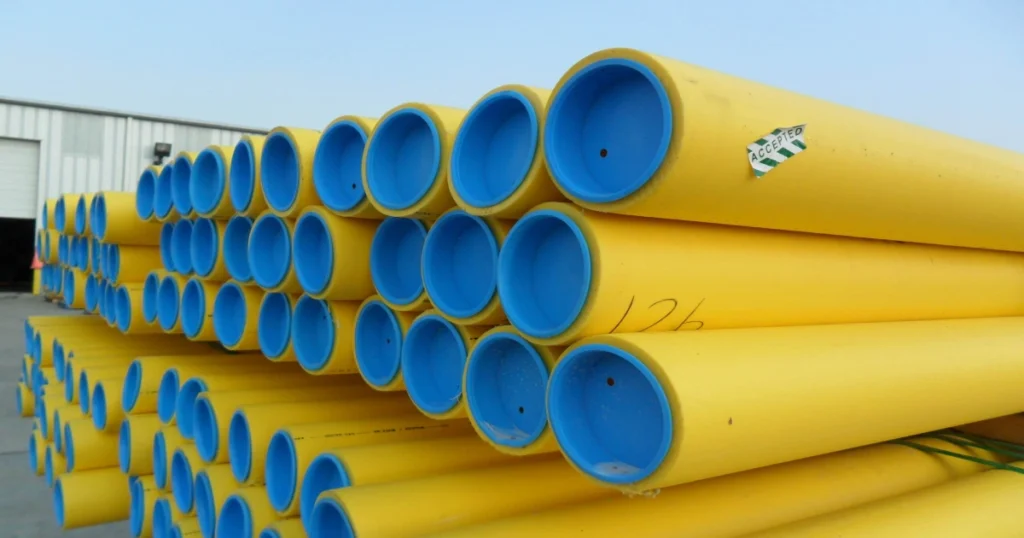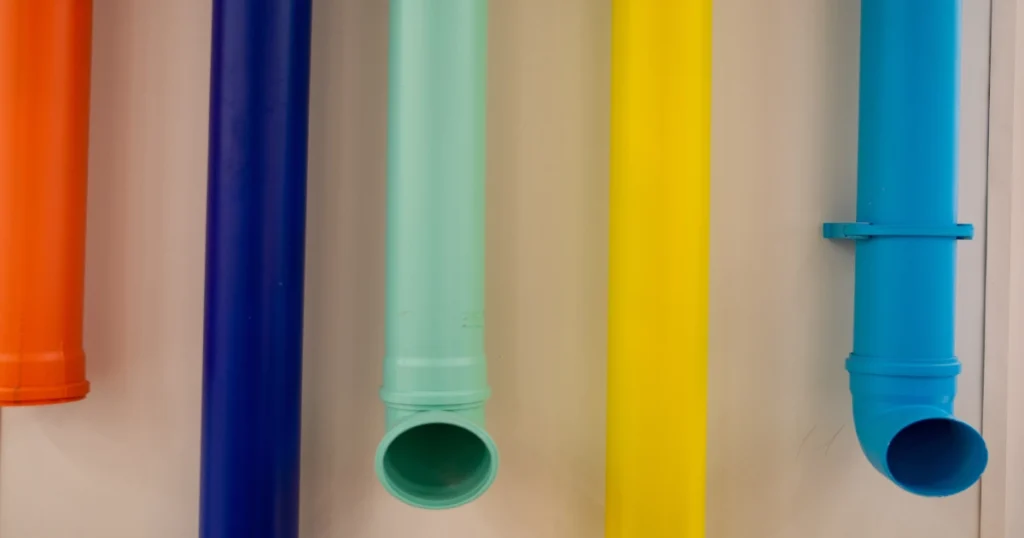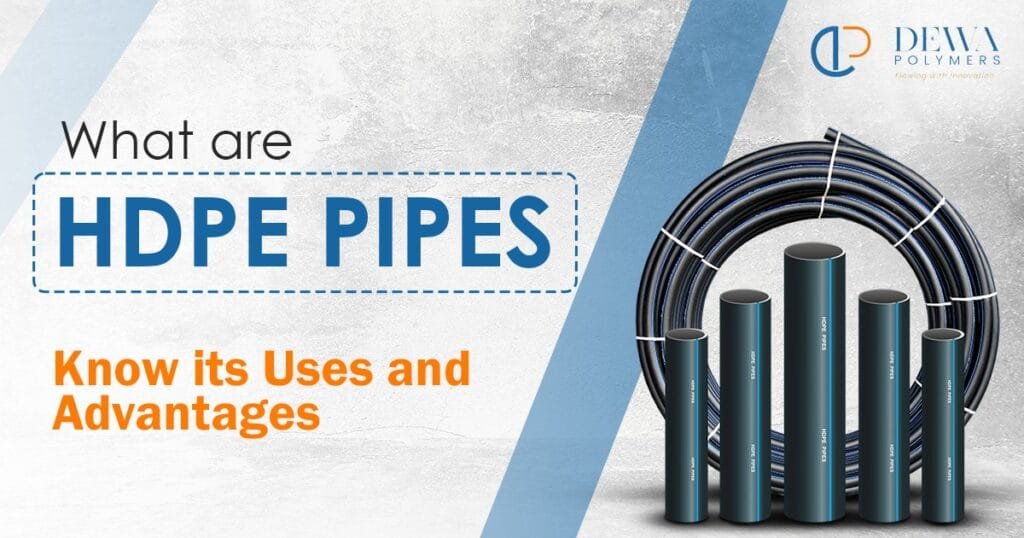Few people take the time to consider the underground pipes that transport chemicals, water, and gas. These revolutionary conduits, known as HDPE pipes, are true marvels in the piping industry. Widely used across the globe in sectors such as agriculture, urban water supply, chemical industries, and the oil and gas sectors, HDPE pipes are revolutionising the management of essential resources.
In this comprehensive guide, we delve into the world of high-density polyethylene pipes. We’ll explore their properties, applications, uses, advantages, and benefits. Read along, as we uncover how these fascinating pipes are shaping the future of infrastructure.
Top Advantages of HDPE Pipes, Uses, Benefits
The fascinating HDPE pipes offer various advantages, which include the following:
- Corrosion Resistance: HDPE is inherently resistant to corrosion, unlike metal pipes which can rust or corrode over time. Therefore, they have a long service life and minimal maintenance costs.
- Flexibility: HDPE pipes are flexible and ductile, making them easier to install in challenging terrains or around obstacles. This flexibility also helps them
- Lightweight: HDPE pipes are significantly lighter than traditional metal pipes, making them easier to transport and handle, which reduces installation costs and labour requirements.
- Leak-Free Joints: HDPE pipes use fusion welding or electrofusion techniques to create strong, leak-free joints. This ensures a reliable and durable pipeline system.
- Long Service Life: HDPE pipe’s lifespan exceeds 50 years. Also, their resistance to corrosion and other environmental factors translates to long-term cost savings and reduced maintenance needs.
- Chemical Resistance: HDPE pipes are resistant to a wide range of chemicals, making them suitable for various applications, including those involving corrosive or abrasive substances.
- Eco-Friendly: HDPE is a recyclable material, making it an environmentally friendly choice. Additionally, the production process of HDPE pipes has a lower environmental impact compared to some other materials.
- Cost-Effective: While the initial cost of HDPE pipes may be slightly higher than some traditional materials, their long lifespan, low maintenance requirements, and reduced installation costs make them a cost-effective solution in the long run.
Benefits of HDPE Pipes
High strength and durability
HDPE pipes can endure high internal and external pressures as they have exceptional strength-to-density ratios. Therefore, their innate strength and ductility, allow HDPE pipes to withstand a wide range of loading situations. Consequently, they are incredibly long-lasting and dependable.
Flexibility and ease of installation
HDPE pipes are flexible. So, they are suitable for projects in difficult terrain or shifting soil conditions. HDPE pipes have a fascinating capacity, that allows them to be bent without breaking. Therefore, makes installation easier and requires fewer connections and joints. Consequently, projects are completed on time and cut labour costs.
Corrosion and chemical resistance
HDPE pipes have outstanding resistance to corrosion and chemical reactions. Therefore, they do not rust like traditional metal pipes when exposed to strong chemicals, Consequently, they are perfect for transporting materials, including industrial waste and chemicals without affecting the pipes’ structural integrity.
UV resistance and longevity
HDPE pipes can withstand the effects of ultraviolet (UV) rays from the sun. Therefore, the HDPE pipe material does not deteriorate from prolonged use or exposure to external elements. Consequently, they have a long life span and offer reduced replacement frequency and long-term cost savings.
Leak and crack resistance
HDPE pipes are resistant to leaks and cracks as they are smooth and have excellent joint integrity. Therefore, they are especially important for applications where leaks could present safety risks. Hence trustworthy HDPE pipes are leak-resistant options in various sectors.
Environmentally friendly
HDPE pipes are environmentally sustainable with zero carbon footprint during production, shipping, and disposal. Moreover, they are recyclable. Consequently, HDPE pipe projects contribute to the preservation of the environment.
Cost-effectiveness
HDPE pipe’s initial material costs may be slightly higher than those of traditional alternatives. However, in the long run, they prove to be incredibly cost-effective as they require less maintenance, fewer repairs and use less energy during transit.
Versatile and diverse applications
HDPE pipes are suitable for a variety of applications. These flexible HDPE pipes adapt to a variety of project requirements, including water distribution and stormwater drainage, industrial processes and geothermal heating systems.
Applications of HDPE Pipes in Various Sectors
The revolutionary HDPE pipes are extensively used across various industries and applications due to their unique properties.
Key areas where they are widely employed:
HDPE pipes for water supply
HDPE Pipes are widely used in Water Supply and Distribution for both potable and non-potable water distribution systems, including:
- Municipal water supply networks
- Rural water supply schemes
- Industrial water supply lines
- Fire protection systems
Sewerage and Drainage
The versatile HDPE pipes are used in sewerage and drainage applications.
- Sewer mains
- Stormwater drainage
- Sewage treatment plants
- Industrial effluent pipelines
Gas Distribution
The leakage-resistant HDPE pipes are widely used for natural gas and other gas distribution networks,
Irrigation Systems
These innovative and revolutionary HDPE pipes are a preferred choice for irrigation systems, including:
- Sprinkler irrigation
- Drip irrigation
- Centre pivot irrigation
Industrial Applications
Revolutionising workflow in the industrial sector, HDPE pipes are used in various industrial applications:
- Chemical processing plants
- Petrochemical industries
- Food and beverage processing
- Mining and mineral processing
Telecommunications and Power
Widely serving as conduits, HDPE pipes are used for
- electrical cables,
- fibre optic cables, and
- other telecommunication lines.
Marine Applications
Global marine applications run on HDPE pipes such as:
- Offshore oil and gas pipelines
- Marine outfalls
- Aquaculture
Agricultural Applications
Various agricultural operations run on HDPE pipes such as:
- Livestock watering
- Agricultural drainage
- Slurry pipelines
Civil Engineering
- Most civil engineering applications, use HDPE pipes such as:
Road construction - Bridge construction
- Tunnel construction
Various Uses Of HDPE Pipes
The uses of HDPE pipes are gaining traction in many areas as the pipes can be used in construction, marine, oil and gas, and municipal and agricultural applications. Also, it is suitable for above-ground, underground, underwater, and above-water/floating conditions.
Industrial and construction
Municipal districts use HDPE pipes to transport drinking and wastewater and to supply water for irrigation projects, and fire hydrants. They are also employed in heavy-duty projects such as dewatering and dredging operations due to their high tensile strength and resistance to corrosion, cracking, and abrasions.
Trenchless installation method
Contractors and engineers install HDPE pipes through the trenchless method as it does not disturb the ground surface or nearby pavement over the length of the pipe.
Oil & Gas
Due to their cost-effective nature, HDPE pipes are used by oil and gas/energy companies during fracking to transport frac water. Also, to collect and transport the hydrocarbons from pay zones and transport liquids and natural gasses.
Chemical and water supply
The tensile HDPE pipes are resistant to chemicals and have low moisture absorption. Therefore, they are used in water supply lines and three production phases in oilfield sites. Also, HDPE pipes are used for transporting raw and brine water, coal bed methane, landfill methane, and leachate.
Food
HDPE pipes specifically designed for the food industry, are used exclusively in the manufacturing of durable and easy-to-clean cutting boards. Also, HDPE are food safe and an excellent option for environments regulated by strict sanitary standards.
Medical and pharmaceutical
High-density polyethylene pipes do not absorb moisture and offer excellent chemical resistance. Therefore, the nontoxic and food-grade, HDPE serve as work surfaces or or medical containers.
Chemical
HDPE pipes have chemical resistance and weldability. Therefore, they are used for bottles, containers, tanks, and corrosion-resistant chemical liners intended for chemical products.
Maritime
HDPE Pipes are suitable for designing boat components and pool equipment, including benches, seats, doors, and handles.
Benefits of using HDPE pipes in various applications
There is a surge in the popularity of High-Density Polyethylene (HDPE) pipes across diverse applications, owing to their exceptional properties and remarkable versatility. They have gained recognition for their numerous advantages over traditional piping materials in crucial sectors such as water supply, gas distribution, agriculture, and sewage systems.
Here are the eight key benefits of utilizing HDPE pipes in various applications:
Resistant to chemicals
HDPE have high corrosion resistance and hence is an ideal material for storage containers for liquids, food and chemical products with varying pH levels. Also, they are safe and effective.
Certified food grade
HDPE pipes meet FDA sanitary and safety standards. Therefore, they are safe for food and beverage storage and easy to clean.
Durable and lightweight
The lightweight density of HDPE ranges from 941 kg/m3 to 965 kg/m. Therefore they are used in applications where the light weight of high-density polyethylene is a decisive advantage.
UV resistant
HDPE pipes have several UV-resistant formulations making them ideal for outdoor applications, including playground equipment for schools and parks.
Easily machinable and weldable
High-density polyethylene is durable. Therefore, they can be welded to design larger projects, including watertight tank liners.
Superior Strength and Durability
HDPE pipes have exceptional strength and durability, making them suitable for underground and aboveground installations. Also, the high tensile strength can face extreme temperature variations, soil movements, and external loads. So, they resist cracking, abrasion, and impact, ensuring long-term performance and minimal maintenance requirements.
Flexibility and Easy Installation
HDPE pipes offer flexibility. Therefore, they can be bent to suit direction changes without additional fittings. Therefore, they are easier to handle and transport, reducing installation time and labour costs. Also, they are an excellent choice for projects with varying terrains or challenging installation conditions.
Corrosion Resistance
HDPE pipes resist rust or chemical reactions. Therefore, they are best for applications that involve acidic substances. The corrosion resistance of HDPE pipes is suitable for use the pipes in chemical processing, wastewater treatment and industrial applications.
Excellent Flow Characteristics
The smooth inner walls, provide excellent flow characteristics and minimise friction losses and promote laminar flow, reducing energy consumption and pressure drops within the pipe system. Therefore HDPE pipes ensure efficient fluid transportation and optimized system performance in water supply, irrigation, or gas distribution,
Leak-free
HDPE pipes use heat or electrofusion methods, creating strong and leak-free connections. Therefore, they are highly reliable and resistant to leakage ensuring a seamless and monolithic system. This eliminates the risk of joint failure and potential leak points.
Long Service Life
HDPE pipes have a long lifespan often exceeding 50 years. Therefore, their durability, resistance to environmental stress cracking, and UV resistance contribute to their longevity. Consequently, reducing lifecycle costs makes them a sustainable choice.
Cost-Effectiveness
The initial cost of HDPE pipes may be higher than some alternatives, but the long-term benefits outweigh the initial investment. Therefore, they offer lower maintenance and repair costs and hence they are cost-effective.
Environment Friendly
HDPE pipes leave a low carbon footprint and they are recyclable into new HDPE products. Therefore, they reduce waste generation and promote a circular economy. Moreover, they are non-toxic and ensure water supplies’ safety. They contribute to energy savings during transportation and installation as they are light in weight.
Conclusion
So, now you have a fair idea about the unique properties of HDPE pipes that make them a modern marvel. Moreover, you now know how they offer a sustainable and efficient solution for a wide range of applications in various sectors.
Are you ready to utilise the HDPE pipes in your next project? You may consider contacting DEWA Polymers today. Also, you can explore our high-quality HDPE pipe solutions and MDPE pipe solutions for your needs, Call us +91 9859920443 at to schedule a meeting.










